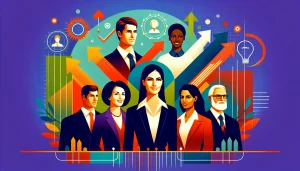Identifying and developing talent in All Industries
Identifying and developing talent in all industries can have negative impacts on both individuals and the industries themselves. Firstly, the focus on identifying and developing talent often leads to a bias towards those who already possess certain skills or traits, neglecting the potential of those who may not fit into traditional talent categories. This can result in a lack of diversity and the exclusion of individuals who may have unique perspectives and ideas.
Additionally, the pressure to identify and develop talent can create a cut-throat and competitive culture in industries. This can lead to individuals prioritizing their own advancement at the expense of teamwork and collaboration. It also creates high levels of stress and burnout, as individuals are constantly under scrutiny to outperform their peers.
Furthermore, the emphasis on talent development may divert resources and attention away from other important aspects of business operations, such as employee retention, organizational culture, and ethical practices. It can result in a narrow focus on individual skill development, disregarding the overall well-being and long-term success of the organization.
In summary, while identifying and developing talent can have its benefits, the negative impact includes the exclusion of diverse perspectives, a competitive and stressful work environment, and a potential neglect of other important aspects of business operations.
The impact of Artificial Intelligence (AI) in resolving the challenges of identifying and developing talent cannot be overstated. AI has revolutionized the recruitment and talent management processes across industries by enabling organizations to streamline their hiring strategies, harnessing the power of big data and machine learning algorithms to make informed decisions.
One of the primary challenges in talent identification is the large volume of resumes that organizations receive for each job opening. Manual screening of resumes is a time-consuming and subjective process, prone to human bias and errors. AI-powered recruitment platforms can automate this process, significantly reducing the time and effort required to identify potential candidates. These platforms utilize natural language processing algorithms to analyze resumes, assess candidates’ skills, qualifications, and experience, and rank them based on their suitability for the job. This not only accelerates the recruitment process but also ensures that all applicants are given a fair chance, eliminating unconscious biases.
Furthermore, AI can enhance the accuracy and objectivity of talent assessment. Traditional assessment methods often rely on subjective evaluations or self-reporting, which are susceptible to biases and inaccuracies. With AI tools, organizations can leverage simulations, games, and online assessments to measure candidates’ cognitive abilities, problem-solving skills, and job-related competencies. These assessments provide a more objective and standardized approach to talent evaluation, allowing organizations to identify the best-fit candidates based on data-driven insights.
AI also plays a crucial role in talent development by facilitating personalized learning and continuous skills enhancement. Intelligent learning systems can analyze employees’ performance, identify skill gaps, and recommend targeted learning resources to help individuals develop their capabilities. AI-powered learning platforms can offer adaptive, personalized content, assess learners’ progress, and provide real-time feedback. This not only improves the efficiency of talent development programs but also enhances employee engagement and satisfaction.
In conclusion, the impact of AI in resolving the challenges of identifying and developing talent is undeniable. By automating recruitment processes, improving talent assessments, and facilitating personalized learning, AI empowers organizations to make more informed decisions, reduce biases, and optimize the talent management lifecycle. As the technology continues to advance, AI will undoubtedly play a crucial role in shaping the future of talent identification and development across industries..
Leadership coaching
Leadership coaching propels careers by refining leadership skills, enhancing emotional intelligence, and fostering adaptability in any dynamic business environment. It equips leaders for new and higher responsibilities, improves team dynamics, and encourages continuous learning and strategic planning, paving the way for professional success and fulfilment.
Get a leadership coach on www.coachup.sg. For more Grow As A Leader content, check out Growasaleader.co





